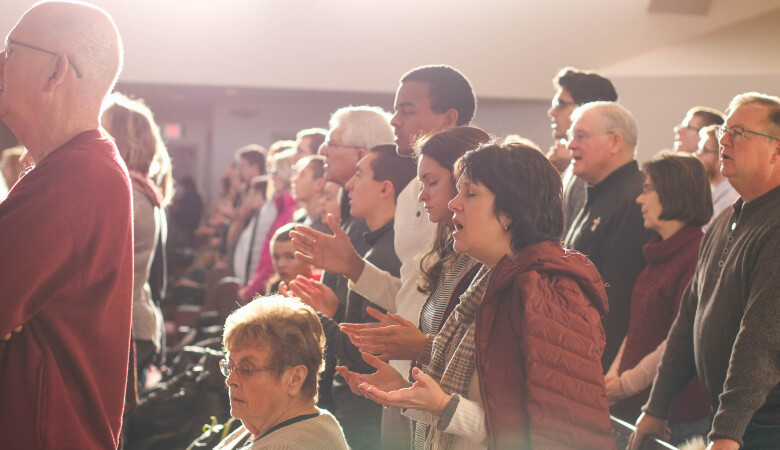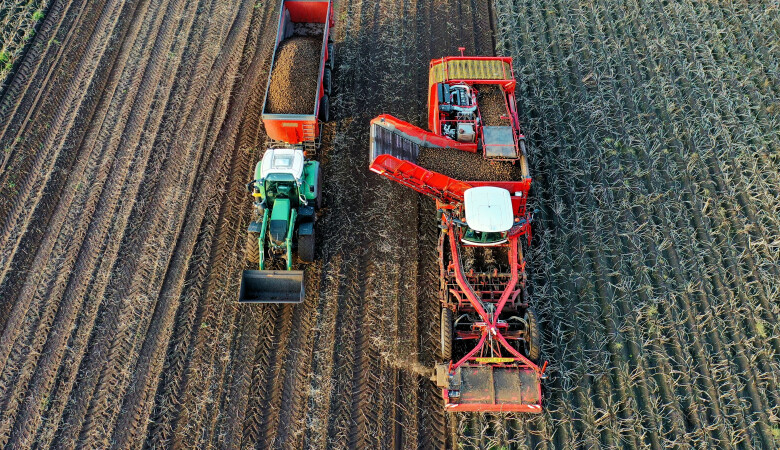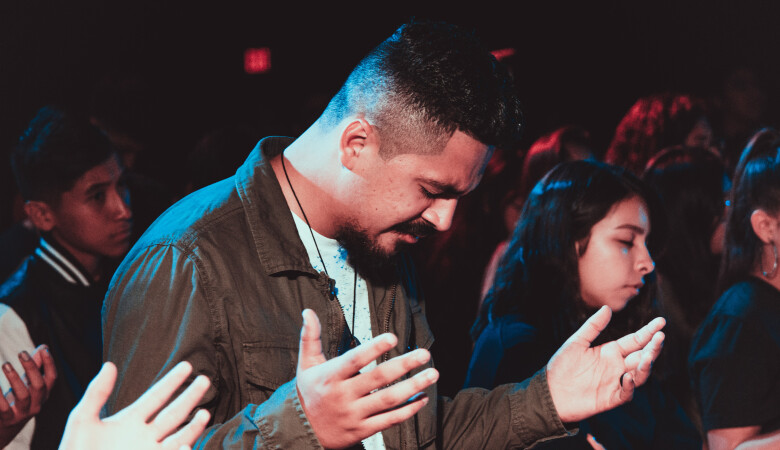Series: James
The Power of Prayer Unleashed in the Church (James Sermon 12)
March 29, 2020 | Andy Davis
James 5:13-20
Unity, Prayer, Spiritual Warfare, Worship
Introduction
Well, this is my third opportunity to live stream with you, so grateful that you could join us today, and I'm grateful for the opportunity that I have to minister the word of God. These are certainly extraordinary times that we're living through. I've never been through anything like this in my life, I know neither have you. And we're aware through the Internet, through the news services of the untold millions that are affected by this, over half a million that have actually caught the disease, and some good number, tens of thousands have died. We're also acutely aware of the economic impact on all people but on small businesses, on hourly workers, and we're mindful of all of this and beyond this, there are just so many changes that this has brought, which have produced a lot of disappointments, things that people were intending to do, they were hoping to do, and now they can't do them, and so they are very disappointed. And there's not one of us that's not suffered to some degree, some changes and some disappointments and some setbacks because of this, but we should look beyond all of this to Almighty God who sits on a throne, he sits enthroned in the heavenly realms.
We should understand that God rules over Heaven and Earth. “That all the nations before him are like specks of dust on the scale and like drops of water from above.” God is king over all. And not only that, but he is doing a secret work in the lives of people all around the world by these changed circumstances. Things that we will not really fully understand until we get to Heaven, but God is at work around the world, he uses times of suffering, and when he chooses to, and when he moves his little finger, the flood of this virus will recede like the waters of Noah's flood and we will return to the beautiful world still under the curse of Adam. We know that death is the final enemy, and it's going to be here until the Lord returns, until the Lord comes, but we'll return God willing to normal life. But not only that, every step of the way God is going to give us everything we need for life and godliness, and he's going to do that by the ministry of the word. We're going to be fed, we're going to receive in the scripture, the food of faith, and that's what we're here for, today. This morning is no different. How wonderful has this journey been for us through the Book of James? And it's coming to an end this morning.
And isn't it incredible how perfectly God's word lines up with our circumstances again and again? Now we follow a pattern of sequential exposition here in this church and we go from passage to passage, book after book, and last week we saw how beautifully the text lined up with the suffering and the circumstances that we're going through, we're told to be patient in affliction. Patient in suffering, through James 5:7-12. We need to be patient like a farmer waiting for the autumn and spring rains. We need to be patient like the prophets who spoke the word of God to reluctant people. We need to be patient like Job, who lost everything of earthly value in this world. All his possessions, he lost his children under the secret assault of Satan, but he never lost his faith. And he said, "Though he slay me, yet will I trust in Him. And though worms destroy this body, yet in my flesh I will see God." Now how timely is that reminder that word from the Lord. How timely was it last week? And this week we're going to be fed again with another timely word from the Book of James, the power of prayer when facing any and every circumstance that we could face in life. Things that afflict us, things that make us happy. And how prayer is the uniting theme of this text. And especially prayer in times of sickness, and we see how perfectly God's word lines up with our circumstances.
Now, we western Christians are used to looking to technology, to science, to solve so many of our life problems. We forget about God's amazing power to heal sick people directly, especially through prayer. God heals every disease and sickness, categorically. Every disease and sickness known to man, God heals people suffering from those illnesses. And he does it daily, even hourly whether those sick people acknowledge him or not. “God causes the sun to rise on the evil and the good. God sends rain on the righteous and the unrighteous,” and so, he also sends the blessings of healing on people around the world who don't even know him or acknowledge him day after day. Now, it's true. Sometimes God uses technology, uses science. He uses medical research, pharmaceutical research, amazing technologies like radiation therapies or even genetically designed therapies that didn't even exist five to 10 years ago, tailor-made for specific people that are suffering.
We here in Durham are near some of the very best research hospitals in the world, and not just a few miles from where I stand right now are some of the best pharmaceutical companies in the world. And we've heard many people praying for a cure to COVID-19, and people we know are working on that. And when God just opens up his hand, he's going to give secret insights to scientists as he's done time and time again. Again, whether those scientists acknowledge him or not. Some of those researchers are believers, brothers and sisters in Christ who do their work as an act of worship to the Lord, and God may show them insights to help them discern how to heal this. Sometimes he uses people who are not believers, who don't acknowledge him at all. I believe in Heaven God's going to get credit for all of the scientific advancements there have ever been in history. When credit was robbed from him in this world, it's going to be given to him in Heaven. So we wait on God for that. But we're also aware that God heals directly. Sometimes he uses medicine, sometimes he uses surgeries, but he's able to extend his hand and heel and He does it many times in answer to prayer. God is a healer, the Bible reveals this plainly. Exodus 15:26, "I am the Lord who heals you.” “I am the Lord who heals you." Again, Psalm 103, the first three verses says, "Praise the Lord, O my soul, all my in most being, praise his holy name. Praise the Lord, O my soul, and forget not all his benefits, who forgives all your sins and heals all your diseases." And again, see the sovereignty of God in all of this. In Deuteronomy 32:39, the scripture there says, "Behold now that I myself am he. There is no God besides me. I put to death and I bring to life. I have wounded and I will heal. And no one can deliver anyone out of my hand," that's Deuteronomy 32.
Now, some day as I said, this COVID-19 virus, like every other disease ever known to man, and every other injury ever known to man in this dying world of ours will become obsolete. Hallelujah. We are going to the New Heavens and the New Earth where it says in Revelation 21, “He will wipe every tear from our eyes, there will be no more death, or mourning, or crying, or pain, for the old order of things has passed away. He who is seated on the throne said, ‘I am making everything new.’ And then he said, write this down, for these words are trustworthy and they are true.”
So, he wanted that vision written down by the Apostle John, so that we could read it and be encouraged. And then in the next chapter of Revelation, Revelation 22:1-3, these wonderful words, amazing words, "Then the angel showed me the river of the water of life as clear as crystal flowing from the throne of God and of the Lamb down the middle of the great street of the city. And on each side of the river, stood the Tree of Life bearing 12 crops of fruit, yielding its fruit every month, and the leaves of the tree are for the healing of the nations. No longer will there be any curse. The throne of God and of the Lamb will be in the city, and his servants will serve him, and they will see his face." That's our future. Every disease and sickness, obsolete by the Tree of Life. But we're not there yet. We know we're not there yet. We're a week closer. Praise God, every week brings us closer to that wonderful vision, but now is a time of suffering, it's a time of sorrow and in some rare cases related to this disease, it is a time of death, and God is calling on us to pray to him as never before. This affliction is an opportunity to unleash the power of God through prayer for healing. And no text in the Bible is better for this purpose than James 5:13-20.
Now, many of us definitely myself included, feel how weak we are in prayer. I don't consider this a great strength in my life, I often feel defective in prayer, I feel powerless. And often we feel guilty about our prayer lives that we do not pray as we should. Now, we've read so many great quotes from church history of the men and women of God who have been men and women of prayer, and then they have given encouragement to their brothers and sisters about prayer. I was reading this week Charles Spurgeon, and he had a lot to say about prayer. Spurgeon said this, "To pray is to enter the treasure house of God and to gather riches out of an inexhaustible storehouse." What an incredible image that is. Like we're going into Ali Baba's cave, but it's not like the door is going to close, we have to say, “Open sesame.” We're going to go in and just get all the riches of God's grace and His power and His goodness. Again, Spurgeon said, "The ship of prayer may sail through all temptations, doubts and fears straight up to the throne of God." What a great image that is. But on the other hand, Spurgeon warned, neglected prayer is the birthplace of all evil. Can I just urge you, friends, Christian brothers and sisters, do not neglect prayer during this time. Do not let sin drive out prayer. John Bunyan said, "Prayer drives out sin or sin drives out prayer," and so, don't let that happen to you. Don't be prayerless.
Alright, well, we read those great quotes, but then we look at our own prayer lives, and we see the weakness of our prayer lives, and we know that we need help. God has sent the Holy Spirit as the primary instructor in prayer. Charles Spurgeon, again, said this, "Prayer is an art which only the Spirit of God can teach us. He is the giver of all prayer." Well, that's a great quote from Charles Spurgeon isn't it? But isn't it better to hear the Holy Spirit himself through the Apostle Paul talk to us about this. Listen, Romans 8:26, it says, “in the same way the Spirit helps us in our weakness. We don't know what we ought to pray for, but the Spirit himself intercedes for us with groans that words cannot express.” So the primary way that the Spirit helps us in our weaknesses is by instructing us through the scripture on prayer and James 5 is a wonderful place to start.
I. When Should We Pray?
Pray At All Times for Every Reason
So, let's begin by just following the order of the text, and ask when we should pray and then closely related to that, we're going to ask who should pray. Let's begin with, when we should pray. Verse 13, look at verse 13, it says, "Is anyone among you suffering? You should pray." So we should pray when we're suffering. What about when we're happy? Verse 13, “Is anyone happy? Let him sing songs of praise.” So that may not refer to prayer, but you can imagine singing the song up to God out of thankfulness. When we are sick, verse 14-15, “Is any one of you sick? He should call the elders of the church to pray over him and anoint him with oil in the name of the Lord. And the prayer offered in faith will make the sick person well. The Lord will raise him up”. And then when we have sinned, we should pray. Again, verse 15, “If he has sinned, he will be forgiven. Therefore confess your sins to each other, and pray for each other, so that you may be healed. The prayer of a righteous man is powerful and effective.” So honestly, there is no circumstance in our lives when we should not pray. As the scripture says, pray without ceasing. Or even better, Ephesians 6:18 has a marvelous detailed unfolding of this. It says, “Pray in the Spirit on all occasions with all kinds of prayers and requests with this in mind, be alert and always keep on praying for all the saints.” Comprehensive prayer life. Alright, that's when we should pray, always.
II. Who Should Pray?
Individual Christians: Pray for Yourselves
Who should pray? Let's circle back and look at that. Well, let's start with individual Christians. Individual Christians should pray for themselves, you dear Christian should pray for yourself. When you're in trouble. “Is any one of you in trouble? He should pray.” James talking about trouble uses a general word for suffering or affliction of any type. Whenever you're suffering, whenever you're in trouble, you should pray. Suffering often pulls individuals away from God. It can make us wrongly distrust God. We may question him, wonder what he's doing, wonder who he is. I remember reading the story of the great missionary to Burma, Adoniram Judson, and at the lowest part, I would say of his entire life, he lost his wife Nancy, he lost their little baby as well, nothing good really had happened in his ministry, and he went out into the jungle nearby where he lived and he dug a hole there, like a grave and sat staring into it for hours. And he said with despair, "I came to bring life and have brought nothing but death." And then he said this, “God is to me the great unknown. I believe in him, but I can't find him." That's what can happen in suffering. It can feel like, God, who are you? Where are you? Job, got to that point. In Job 30:20-22, Job said, "I cry out to you O God, but you do not answer. I stand up, but you merely look at me. you turn on me ruthlessly. With the might of your hand you attack me, you snatch me up and drive me before the wind, you toss me about in the storm." Well, when we're going through afflictions, sorrows, difficulties, that's exactly the time we should draw near to God in prayer. Just take the text simply. Verse 13, “Is anyone of you suffering? Let him pray.”
The Happy Should Pray
Secondly, individuals should pray whenever they're happy. “Is anyone happy? Let him sing songs of praise.” At our happiest times we should go back to God and we should thank him for those blessings and sing praises to him with “songs, and hymns and spiritual songs in our hearts with gratitude to God.” Earlier in James we learned, “every good and perfect gift is from above, coming down from the Father of the heavenly light.” So, if you're happy, it's because God has done something to make you so. He's given you some blessing, go back and sing a song of praise to him. So prayer should be the life breath of our individual daily walk with Christ. Jesus in John 15, gave that beautiful analogy, "I am the vine and you are the branches.” We need to abide in him. Remain in Him. And He makes it very plain that happens by the ministry of the Word combined with prayer. He said, "If you remain in me and my words remain in you, then ask whatever you wish, and it will be given to you. This is to my Father's glory that you bear much fruit, showing yourselves to be my disciples." So we should pray continually, individually in our walk with Christ, as an expression of our walk with Christ. But we also can see a corporate life of prayer here as well. We are blessed to be in a healthy local church. One of the greatest blessings in my life is to ust a member of First Baptist Church, Durham. It's a great blessing, and James in this text, extends prayer out beyond the individual level to others in the Church, beginning with the elders of the church.
The Elders of the Church for the Sick and Sinning
Look at verse 14, "Is any one of you sick? He should call the elders of the church to pray over him and anoint him with oil in the name of the Lord." This is a fascinating passage. Sickness, elders, anointing with oil, and then the issue of sin. There's a lot to unravel here. The Roman Catholic church found, in this text, grounds for the seventh sacrament, which they called extreme unction done to the dying in the same way prosperity Gospel people and health and wealth people have come to this text, and found sacred anointing oils that you can... They'll give it to you if you send them a healthy donation to their TV Ministry, something like that. So you can get little bottles of oil. So it just comes from this. So there's a lot of questions that we may have as we read this. What is this talking about? Well, let's keep it simple initially, just in terms of church government polity, you can see the plural elders here in a single local church. “Is any one of you sick, you should call the elders [, plural,] of the church.” So, we believe that this is strong evidence for the plurality of elders within a local church. But why should a sick person call the elders? Well, there is a sense of spiritual leadership in elders. They should be men mighty in prayer. They should be men able to wrestle on our behalf in prayer, and to be victorious.
And when they come it says, they should anoint the sick person with oil. What does that mean? One of two possibilities. One is that this is a spiritual, sacred or symbolic anointing, so it's completely spiritual, sacred, symbolic, and the other is, it may refer to actual medicines. The application of physical medicine. So, the first, in terms of the sacred anointing, or the spiritual anointing, we know in the Old Testament.Significant individuals in society prophets, priests and kings were anointed with oil to mark them apart. So the king would sometimes be called the Lord's anointed. And the flowing down of the oil in the head represented the ministry of the Holy Spirit in that person's life. So anointing the sick person with oil would be bringing in the ministry of the Holy Spirit symbolically, not that anything really happens through the actual physical oil, but that the Holy Spirit comes in, and ministers. But it's also possible that the anointing with oil represents the application of physical medicines. And so we Christians are not at all averse to medical procedures, surgeries, the binding up of wounds and the application of medicines. And so the oil may represent all of those things. Isaiah 1:6 says, "From the sole of your foot to the top of your head, there's no soundness only wounds and welts and open sores, not bandaged or cleansed or soothed with oil." So that that would be a therapeutic approach there. Again, Good Samaritan, Luke 10:34, "The Good Samaritan went over to the wounded man who was lying by the side of the road, bandaged his wounds and poured on oil and wine, and then he took the man on his own donkey and took him to an inn and took care of him."
Now, some commentators argue against this saying like oil is just linked to injuries not to sickness, but it could be that this is just representing all physical methods of healing which we believe in and we use, though we do not trust in them ultimately. It could be that the elders of the church might be among the wisest in the community at dealing with sickness back in Jesus' day, back in the days of the apostles. It was so often the case, this was before the Industrial Revolution before the Scientific Explosion, where we separated out and the scientific methodology was applied to medicine and you became a scientific medical specialist. And we have many of those beautifully in our church. But even back in the Puritan days and in the days of the pilgrims, the best healers in the community frequently were the pastors, they were the most educated ones. And those were things that pastors would learn is basic first aid and care. So, at any rate, these are what a sick person should do.
Notice also that James links sickness with possible sin, possible sin. Look at verse 15 and 16, "The prayer offered in faith will make the sick person well. If he has sinned, he will be forgiven. Therefore, confess your sins to each other and pray for each other so that you may be healed. The prayer of a righteous man is powerful and effective." So there's a clear linking in those verses between possible sin and the sickness. So now we have to deal with the question that comes up again and again, “Is there a link between sin and disease? Sin and sickness?” This was a question that came up in Jesus's day with the man born blind, "Who sinned? This man or his parents?” Remember that question. So there's this linking. So what we have to realize is that not every sickness that happens in this world can be directly linked to individual personal sin, but some can. So James raises it up with the word, “if,” that's what the word, if, means: If he has sinned, he will be forgiven. So God sometimes actually does discipline his people, by sickness. In Hebrews 12:6 it says, "The Lord disciplines those he loves and he punishes everyone he accepts as a son." And so occasionally, that discipline may be sickness. I believe every individual Christian who gets sick should bring their sickness privately in their prayer closet to the Lord and say, "Lord, am I being disciplined for some sin?" Psalm 139, "Search me O God, and know my heart, and show me and see if there's any sin in my life." Then when the elders come, I think the elders after comforting, consoling, ministering, medicine or whatever, all of those things, and praying, at some point when it's reasonable, the elders I think, should ask gently and lovingly, "Are you aware of any sin in your life that this might be a discipline for?" Do it at a time when the person is alone, and can answer without shame or embarrassment.
Now, this is a far cry from Job's friends who assume that Job's afflictions were because of his sins. To them it was a given; If you're sick, God is judging you for some sin. That is so far the other direction. So we cannot do that. At one point, one of Job's friends even said to the most righteous man that had ever lived, up to that point, "Is not your wickedness endless?" I mean, that's not a friend, a friend doesn't do that. But the elders, I think, can and should have this kind of ministry. So just bring that up.
Now, COVID-19, we really could say is a worldwide plague. And recently, with one of my kids, I did a study on the word “plague,” and again and again in the Bible, there's a direct link between human sinfulness and plagues that come. And so for us, we ought to see a sense of solidarity with the human race, even if we're not personally aware of any sin in our lives. We're part of a sinful human race in Adam. We should be willing to pray in light of this plague and the connection to the sins of the human race, and pray that God would use this disease COVID-19 to bring people to repentance, that they would see individual sins in their lives, and that they would repent and find faith and find forgiveness in Christ. So individuals should pray for themselves. The elders should pray for the sick, and then the church as a whole should pray for one another.
Church Members for Each Other
James expands prayer to the whole church, again in the context of sickness and sin. He says, "Therefore, confess your sins to each other, and pray for each other so that you may be healed. The prayer of a righteous man is powerful and effective." So if there is any sin involved, that individual should confess his or her sins to God directly. 1 John 1:9 says, "If we confess our sins, he is faithful and just, and will forgive us our sins and cleanse us from all unrighteousness." But this passage isn't talking about that. It's talking about a horizontal confession of sins to one another. And I think sometimes we need to do that. I think in discipleship, we believe in having discipleship partners, men, with men, women with women. And you need to have people in your life that you can do this with. Confess your sins, pray for each other, hold each other accountable. And this is something that accountability partners and prayer partners do for each other. In any case, it is a powerful thing to share in each other's joys and sorrows through corporate prayer. That's a great privilege that we have. And friends if I can say now more than ever, we should be hungrily looking for ways to pray, people to intercede for, expanding ourselves out to find people to pray for.
III. How Should We Pray?
Pray in Righteousness
All right, how should we pray? Well the text has a lot to say about the manner by which we pray. First of all, we should pray in righteousness, in righteousness. It says in verse 16, "The prayer of a righteous person is powerful and effective." Sin blocks prayer, sin blocks prayer. Isaiah 59:1-2 says, "Surely the arm of the Lord is not too short to save, nor his ear too dull to hear, but your iniquities have separated you from your God, and your sins have hidden his face from you, so that he will not hear." So we need to be righteous in order for God to hear our prayers. People often ask, does God hear the prayers of unbelievers? God is under no covenant obligation to hear or answer the prayer of any unbeliever. But what we know as Christians is we all began unrighteous.
Believe on Christ for Salvation
Romans 3 says very plainly, "There is no one righteous, not even one. There's no one who understands, no one who seeks God.” All of us began as unrighteous, and God in his mercy, sent his Son, the only truly righteous man that's ever lived. And he lived a sinless life. And he died an atoning death on the cross so that sinners like you and me can be fully forgiven of all of our sins and be seen to be righteous in the sight of God. So if you are an unbeliever, and you've come to this live stream today, I'm so delighted that you're here. This is a moment that I want you to hear and to listen to the Gospel. God is able through simple faith in Jesus Christ to make you righteous, to make you fully forgiven of all of your sins. Second Corinthians 5:21 says, "God made him, [Christ,] who had no sin, to be sin for us, so that in him we might become the righteousness of God." There's a great exchange that happens at the cross: Our sins are given to Christ and he dies under the punishment and the wrath of God, his righteousness is given to us and we live shining and bright in Heaven forever by simple faith in Christ.
So justification righteousness enables God to hear our prayers, but also there's a matter of practical righteousness. Psalm 66:18 said, "If I had cherished sin in my heart, the Lord would not have listened." So if you are violating your conscience, your prayer life will become powerless. So repent, confess your sins, turn from those things, and draw near to God in prayer. So first, how should we pray? We should pray in righteousness. Secondly, we should pray in the name of the Lord. Again, verse 14, "Is anyone of you sick? He should call the elders of the church to pray over him and anoint him with oil in the name of the Lord."
In the Name of the Lord
Now, what does it mean to pray in the name of the Lord or in Jesus' name? It's not just to say, "In Jesus' name, Amen," so that all your friends know that you're done praying. It's more than that, far more than that. Jesus' name represents his reputation, who he was as a man, how he lived. But more than that it represents his kingdom and his purposes, and his glory, and all of those things. And so to pray in Jesus' name means to pray, lined up with Jesus's purposes, lined up with Jesus' kingdom, lined up with his promises, where he's going, and for his glory. So even the prayer for the sick should be made in Jesus' name: "Lord, Jesus, if it would be for your glory and the advancement of your kingdom that this person should be raised out of this sick bed, please do it." That's what it means to pray in Jesus' name. So often our prayers are not in Jesus' name, but they're for our own selfish purposes. As James talked about earlier in James 4:3, "When you ask you do not receive because you ask with wrong motives that you may spend what you get on your pleasures." This is the time to set all of that aside, and to pray in Jesus' name for his glory, for his kingdom.
In Faith
Thirdly, we should pray in faith. Verse 15, "The prayer offered in faith will make the sick person well. The Lord will raise them up." To pray in faith means to pray relying on Jesus the invisible. To see him who is invisible as seeing him who's invisible, it says that about Moses in Hebrews 11. It means praying, confident that there is an invisible God on an invisible throne, and we believe in his power, and his love, and his compassion, and we're praying, trusting, relying on him in faith. Now we are not thinking like the faith movement, the name it and claim it or prosperity Gospel people that say that faith can create a reality that God never intended. Not at all. I've said for years faith is the eyesight of the soul by which we receive the available light there is in the room. By faith we are lining ourselves up with God's purposes. By faith, we are trusting in him to do what is for his own glory. So that faith movement is so devastating when parents who bring their children to faith healers and then the children die, and then they're told even more they didn't have enough faith. That's not what this is teaching. We trust in God. And we believe in him, we rely on him in prayer. So we should pray in righteousness, we should pray in the name of the Lord, we should pray in faith, and we should pray in expectancy, with an expectant heart, expecting that God is going to do something. I love the King James Version translation of this James 5:16, "The effectual fervent prayer of a righteous man availeth much." Isn't that wonderful?
Pray Expecting A Powerful Outcome
Some time ago, I was driving by a church that had a sign ministry. And I have to be honest, some of the signs that I see in sign ministry are very cheesy, but this one stuck with me, and it was powerful. And it was this, “Pray until something happens.” I was like, "That's incredible." That stuck with me. Let's keep praying, trusting that God is going to work, he's going to act. Prayer is powerful and effective. God wills to do much through prayer. When we pray, we must pray expecting that God can do anything, that God is going to use COVID-19, to work all things together for good for his purposes. For those that are called by his name. Prayer means that so many of the things that God accomplishes, he is going to do through prayer. And we need to know he, Jesus, is every bit as powerful to heal as ever he was in his physical life on Earth.
You read in Matthew 4:24, concerning Jesus, "News about him spread all over Syria, and people brought to him all who were ill with various diseases, those suffering severe pain, the demon possessed, the epileptics, and the paralytics and he healed them." So various diseases, there was no sickness or disease that Jesus could not cure. In Mark 7:37 it says, "People were overwhelmed with amazement, he has done everything well, they said, he even makes the deaf hear, and the mute speak. There is no disease that Jesus cannot cure." And he's the same today as he was then, he's the same yesterday, today and forever. Hebrews 13:8. Notice the statement on healing here, verse 15, “the prayer offered in faith will make the sick person well, the Lord will raise him up.” It's kind of a concentric circle thing where the oil drops off, and you're just left with a prayer offered in faith. And then even the prayer offered in faith drops off and it's just the Lord. The Lord raises him up. In the end, it's the Lord that does it, not the oil, not even the prayer ultimately, but it is the Lord. And notice the expression "the Lord will raise him up." Doesn't that make you think about the resurrection? For me, it does. It makes me think about the ultimate resurrection. Friends resurrection day's in two weeks, but you know, you can actually celebrate it today. We can celebrate that Christ has risen. We actually do as Christians celebrate the resurrection of Jesus Christ every day, and as I've already said, we are going to a world where there'll be no more death, mourning, crying, or pain, every disease will be healed.
So this sick brother or sister in bed, may actually even die from this illness. But we don't need to fear because the Lord will raise him up. The day will come when all who are in their graves will hear his voice and come out. Or as Jesus said in John 11:25-26, "I am the resurrection and the life, he who believes in me will live even though he dies. And whoever lives and believes in me will never die." Do you believe this? So, dear friend, I'm asking you, do you believe that Christ has risen? Do you believe that he is Lord, then God will save you if you call on the name of the Lord, in the resurrected Lord's name, he raises up sick people. Ultimately, he'll raise up all of his people to eternal life. So we must believe in the powerful effectiveness of prayer for God has worked amazing things in redemptive history by the prevailing prayers of his faithful people.
IV. Elijah, a Man of Prayer
Elijah was a Man Just Like Us
Now, he brings out one of the great examples of faith-filled prayer there is and that is Elijah. Elijah, a man of prayer. Look at verses 17-18, "Elijah was a man just like us. He prayed earnestly that it would not rain, and it did not rain on the land for three and a half years." Verse 18, "Again, he prayed, and the heavens gave rain and the earth Earth produced its crops." So Elijah is an example of the power of prayer. Now he begins by saying Elijah was a man just like us or of like passions. We need to be told this because Elijah was different, dear friends, in some very significant ways. Very few of you, if any of you eat locusts out in the desert and wear a leather belt around your waist with camel hair garment. John the Baptist did it because he came in the spirit of Elijah. And then Elijah at the end of his life, ascended to Heaven in a chariot of fire. He didn't even experience death like the rest of us. But James still he's saying, "Look for all of that, he was a man of like passions to us. He was just like us. He struggled physically with the same things, hunger and thirst and weariness, and even discouragement." So James's idea is, Elijah was, in one sense nothing special. And we actually can therefore imitate him in faith-filled prayer. Now Elijah's whole ministry was a display of the power of prayer, so many aspects of it. There are many things we could talk about. But James zeroes in especially on the drought.
James’ Focus on the Drought
We learned something here and this happens from time to time in the New Testament, a well known Old Testament story that there's a detail the New Testament writers tell us that's not in the Old Testament. And one of those is we are told here, Elijah prayed that it would not rain. So before he pops in, mysteriously pops into the narrative, in 1 King 17:1, we've never heard of Elijah the Tishbite, he just pops up and says, "As the Lord lives, before whom I stand, there will be neither dew nor rain, except at my word for the next several years." Then he disappears. Before that ever happened, the text says, James tells us, "Elijah prayed earnestly, fervently, that it would not rain. He prayed for the drought."
Now, you're like, “why would he do that?” Why would anyone pray for an affliction like this? Well, it has to do with the Law of Moses, and with the blessings and curses that Moses gave to the Jewish people, the Israelite nation, before they entered the promised land. And it says very plainly in Deuteronomy 28: 23 and 24, "God said to the Jews, 'I will make the sky over your head to be bronze, and I'll make the ground beneath you iron. The Lord will turn the rain of your country into dust and powder. It will come down from the skies until you're destroyed." Why would God do that? As a direct punishment for idolatry, for falling into the sins of the Canaanites and all of their wickedness, for breaking the covenant. Well, Elijah looked around and said, "Lord, they're breaking the covenant, they've been doing it for for decades. God, would you please bring this discipline, bring this drought so that the people of Israel might turn away from Baal and turn back to you the true Lord." This covenant curse was meant to bring Israel back to repentance. And that's, I think, why Elijah prayed.
Now it's interesting, when Elijah had that contest with the prophets of Baal, in 1 Kings 18, the next chapter, he says something very interesting about his prayer life. As he's praying for fire to fall down from Heaven on the sacrifice, he says this, 1 Kings 18:36 and 37, "Oh Lord, God of Abraham, Isaac and Israel, let it be known today that you are God in Israel, and that I am your servant, and that I have," listen to this, "Done all these things at your command." That's very important. It all started with God. So when Elijah began praying that it would not rain God was ahead of that. And he gave him that prayer burden, "Pray for this Elijah." We never get ahead of God in prayer, we never think of anything first. God is always leading us. And so, "I've done all of these things at your command," and then it continues, "Answer me, oh Lord, answer me so that these people know that you, oh Lord are God, and that," listen to this, "you are turning their hearts back again." So this whole thing came from God through the prayer warrior, to the end that the people would turn back to God and follow him. At the end of the three and a half years, he again prayed for rain, we know that, he kneels down, he sees nothing and then he goes back again. His servant does and he sees nothing, and he goes back a third time. And then there's this little cloud as small as a man's fist, and the rain came.
This is the Confidence We Have in Prayer
Now, this is the confidence that we have in prayer. It's amazing how God linked rain and dew to the word of a man. "There'll be neither dew nor rain in the land for the next several years except at my word." That sounds arrogant, doesn't it? But God gave him that power through prayer. He linked it to Elijah's prayer very much like Joshua in Joshua 10:14 when Joshua prayed that the sun would stand still in the sky, so that they could finish defeating their enemies. The day was lengthened. And Joshua 10:14 says, "There's never been a day like it before or since," listen to this, "A day when the Lord listened to a man." And so God in His wisdom includes us in what he's doing. He draws us in. And he has the idea. Elijah said, "Just let everyone know that I am your servant, I am the Lord's servant." He said that in first king 17:1, "As surely as the Lord lives before whom I stand." In other words, I didn't do this on my own. Ultimately, the man and woman of prayer has stood in the presence of God and heard what the Lord wants him or her to do in prayer. We are as Henry Blackaby said in Experiencing God, finding out where God is at work and joining Him. Better, I think even to say God reveals us to us what he's going to do. He discloses himself to us, and then we join him in it in prayer.
So can I just apply this immediately now to COVID-19? I don't know that any man or woman of God prayed that this illness would come. I don't know that God might actually put a burden like that on someone, because God can use disease to turn people's hearts back to God. But whether anyone prayed that it would come, we can act like Elijah in the midst of this and say, "Oh Lord, use this disease, the way you used the drought back in those days to turn Israel's heart back to you. Let this COVID-19 time turn people's hearts away from materialism, away from lust and sin, away from the pleasures of the flesh, away from all of these things, and turn to God in Christ, finding forgiveness of sins and finding a new rich life in the power of the Spirit.”
V. The Mission of the Church: Rescuing the Perishing
Now Elijah's mission in restoring the Jews, that God was bringing all of the people back to himself through this prayer ministry and drought ministry, links up with the final two verses in the Book of James. Look at them with me, the mission of the church is to rescue the perishing. Verse 19 and 20, "My brothers if one of you should wander from the truth, and someone should bring him back, remember this, whoever turns a sinner from the error of his way, will save him from death and cover over a multitude of sins." Now, the whole book of James has been focused on genuine faith, what does genuine saving faith look like? And the church's responsibility to be certain that people that we know are actually continuing to walk in newness of life. Our church covenant says we will watch over one another in brotherly love. So if you know that someone is wandering away from the faith, make a phone call. I know right now we do social distancing, but at some point that will end and these words will still be there. We need to go after people, we need to go visit them, show up on their doorstep. We need to pray with them. We need to talk to them, say, "You know I've not seen at church recently," or, "You used to come to home fellowship. What's going on in your life?" You know, as Jesus is the Good Shepherd, he leaves the hundred on the hills, and goes to look for the one that wandered off, so must we go after people that wander. We should make phone calls. If they're caught in a sin, we should restore them gently, Galatians 6:1 "watching ourselves." And James says if we win them over we're rescuing them from death, and covering over a multitude of sins.
Now the death we're rescuing them from really isn't so much physical death, though it might be, because God does do that in disciplining for sin. We're talking about eternal death, the second death, Hell, and cover over a multitude of sins. That's the atoning work of Christ. And Psalm 32 says, "Blessed is the one whose transgressions are forgiven, whose sins are covered." And so the covering up is through the blood of Christ through faith in the blood of Christ. So we should pray for each other. We should go after those that are wandering. We should rescue them and bring them back into the fold.
VI. Application
All right, let's finish with some applications during this time of sheltering at home, sheltering in place, of quarantining, COVID-19 and these things, just follow the text. Just do what it says, just step by step. If you're in trouble, pray, take it to the Lord in prayer. I love that hymn. Take it to the Lord in prayer. If you're in trouble, take it to the Lord in prayer. If you have reason to be happy and thankful, and let me just stop and say, find reasons to be happy and thankful. There's so many of them. Take it to the Lord in prayer, and song. If you're sick, or someone you know or love is sick, take it to the Lord in prayer. If you need forgiveness of sins, take it to the Lord in prayer and do it within the context of the church as the text says, find ways to bless people during this crisis. Reach out as you're able, find ways to give. Andy Winn told us about the benevolence fund, give more money, pray for people, find out what needs are in the city and pray. And even once this thing is over, there's still going to be many, many ways we can minister in the aftermath. Close with me if you would in prayer.
Prayer
Father, we thank you for the beauty of your word. We thank you for the things that it teaches us and how it prepares us to live lives that are pleasing you. Thank you for this incredible 12 week journey we've had in the Book of James. Thank you for all the details and the insights. We could have preached 12 more weeks in this incredible book. Lord, help us to pray, teach us to pray, and help us to pray as we have never prayed before, with passion, spending more time in it, working on it, and developing it for your glory. We pray in Jesus name. Amen.












